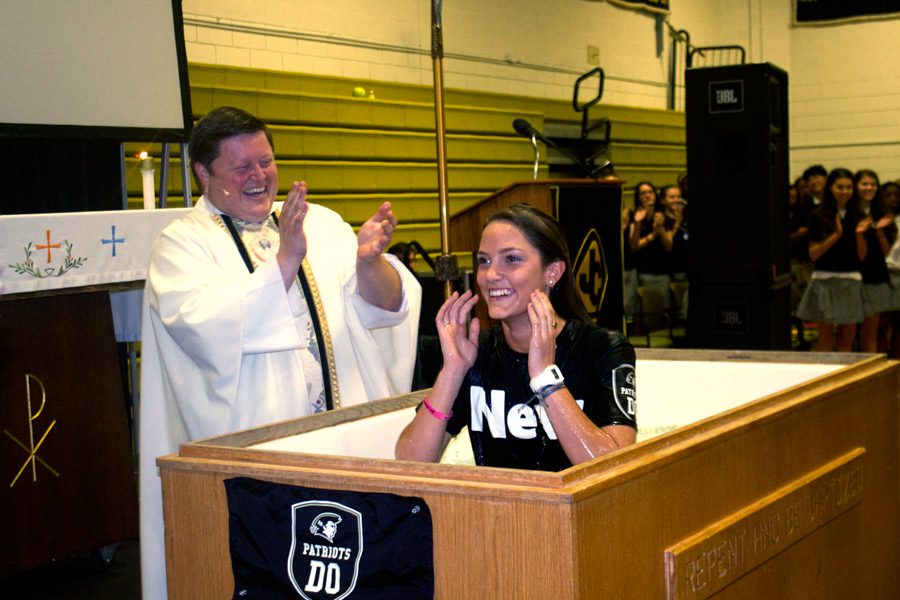Students of different religious backgrounds share their perspectives
Ashley Schwartz rises from a baptismal pool on Friday, April 28 after declaring her Catholic faith at the End of the Year Mass during her junior year. While many share in Schwartz’s Catholic faith, 35 percent of students practice a religion other than Catholicism, according to a survey sent out by The Patriot.
Junior Sehrish Shaukat walks into religion class. She sets down her books and waits for class to begin. The class starts with a prayer that she was unfamiliar with until she began attending JC. Shaukat stands awkwardly as everyone else clasps their hands together in unison.
The teacher turns on a PowerPoint about the sacrament of Baptism, and students around the classroom groan. Some people have been learning about Baptism their entire lives, but this concept is completely foreign to Shaukat.
Shaukat is one of the 35 percent of students that practice a religion other than Catholicism, according to a survey sent out by the Patriot.
Shaukat, for example, actively practices Islam. “I pray five times a day. [Islam’s] super devout and religious. There are a couple of mosques in Baltimore, and when I have time, I’ll go on Friday because that’s our holy day.”
Shaukat’s Muslim community involves a lot of group activities and get-togethers. “In the month of Ramadan, which is around May and June, we go every night, which is pretty fun because I’ll see all my friends and hang out,” Shaukat said.
54 percent of students of a non-Catholic background are Christian but not Catholics, such as sophomore Kate Gromacki, who is Episcopalian. Gromacki and her family share most of the same values and ideals as Catholics, but she sometimes finds the differences to be frustrating. “Sometimes I think it’s kind of tedious, I just like praying to God, not a lot of saints. I think it would be better if they focused on other religions too. We could learn about other things to enhance our own view and help us choose [our religion],” Gromacki said.
Although she didn’t personally make the choice to come to JC, her parents made the choice for her because “it would be a good environment and her siblings had good experiences [at JC].”
Shaukat agrees with Gromacki on JC being a pleasant setting. “I kind of am here for STEM, and I actually just really like the school, too. At other schools like NDP or Bel Air, the people just kind of had a different vibe,” she said.
Social studies teacher Darrion Siler, class of ’01, is another member of the community who is not Catholic. “I am all and no religions. I am a person of faith. I have an openness to truth as it presents itself,” Siler said.
As a high schooler, Siler came to JC for athletics, but he also came to learn more about his faith. “I considered myself a devout Christian, but I also wanted to find myself spiritually. I was always encouraged to do that by my teachers at JC. They taught me to think critically and seek the truth,” he said. “That’s what makes this place great, that you are encouraged at every opportunity you have to explore your faith, whatever that means to you, and having that growing up, being educated on your faith, I think that makes a person.”
Although there is a good percentage of the JC community that practices religions other than Catholicism, 35 percent of non-Catholic students don’t believe in God at all. Freshman Robert Wilson is an atheist because he feels there isn’t enough proof of God. “I don’t think there’s any objective proof [of God], and I don’t believe in anything I don’t have objective proof of,” Wilson said.
Wilson decided to come to JC because of a partial scholarship and the high caliber of the school. “It’s a good school…My parents don’t care that I’m an atheist, and they wanted me to go to a Catholic school. So I applied here because a lot of my friends were going here and I got a partial scholarship.”
However, he feels that some of these religious traditions should not be mandatory. “Instead of forcing me to take Intro to Bible, I should be able to choose which religion class I take. I would rather take a course on church history,” Wilson said.
Siler agrees that diversity in religious teachings is valuable. According to Siler, the Intro to World Religions class for seniors is an important step for JC. “I think it is important that we recognize that there are different faiths and I think understanding something about the world outside of our scope of vision helps us to better understand ourselves, our relation to the world, our faith. Maybe it can give us insights as to why other cultures do things the way they do. It’s important,” Siler said.
Although 49 percent of non-Catholic students would rather not be required to learn about the Catholic religion, 32 percent don’t mind the religious classes, including Wilson. “Going to mass and respecting other people’s religions, I don’t have a problem with that at all,” he said.
Madison Dailey is a Community Editor and Caitlin Kennedy is an Entertainment Editor for The Patriot and jcpatriot.com.



